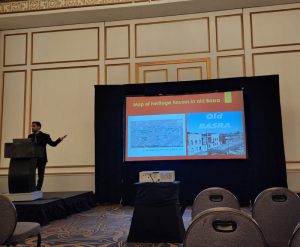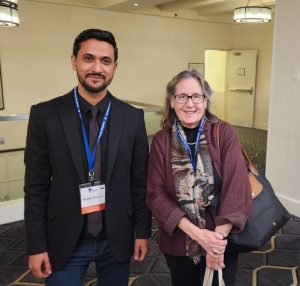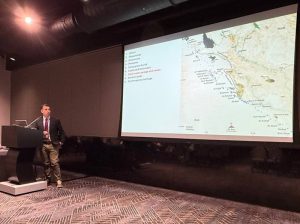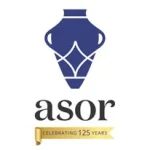
2024 ANNUAL MEETING TIGRIS TRAVEL GRANTS
This was the first year of the Tigris Travel Grant program which supports Annual Meeting participation for scholars from Iraq and its Kurdistan Region. These grants, made possible through the generosity of Kiersten Neumann, covered the cost of flights to the Annual Meeting as well as accommodation in the ASOR hotel. The three scholars who received grants share their experiences at the meeting in Boston.
I was the last passenger!

Mustfaa Al-Hussainy presenting on the Ottoman houses of Basra.
Mustfaa Al-Hussainy, Head of Basra’s State Board of Antiquities and Heritage (SBAH)
I received a call from my friend Jaafar Jotheri at 13:30 on November 15th, the same day I travelled to the US through Najaf Airport; he told me that the American Embassy in Baghdad had finally given us the visa. As I live in Basra, 600 km south of Baghdad, I asked him to pick up my passport to save time and make it to Najaf Airport rather than going to Baghdad and then to Najaf. I arrived at Najaf airport at the last minute, and the boarding person welcomed me and said, “You are the last passenger” as I did the check-in just 5 minutes before closing the desk. However, I felt relieved once I arrived at Boston and said, “This is the city of dreams and research achievement.” After enjoying the opening ceremony in the evening, meeting and greeting old friends, and making new ones, I gave my talk on the morning of the first day of the academic programme. My talk was about reviving the old Basra, where I presented the hard work of UNESCO and the Iraqi State Board of Antiquities and Heritage (SBAH) in reconstructing and preserving the Ottoman houses in Basra and supporting the local Museum of Basra. I was impressed with the many attendees and the questions I received. I thanked ASOR, TARII, and the Tigris Travel Grant Program for helping me make it to the US for the first time and giving me the platform to speak about my project. As everyone knows, Iraqi archaeologists have no funding to travel and participate in international conferences.

Mustfaa Al-Hussainy meeting with Barbara Porter.
After finishing my talk, I did my best to attend talks related to Iraq, as there were so many. I was impressed by the high quality of the work, the multidisciplinary nature of the projects, and the sophisticated methodology of research that the international teams were implementing in Iraq. At the same time, while I was listening to these talks, I was trying to ask myself and anyone sitting close to me in the meeting several questions. Why were the presentations about Iraqi archaeology in English, not in Arabic? Why were they presenting their significant findings in the US, instead of Iraq? Why were there no Iraqi scholars co-authoring their papers? Why aren’t these excavations and survey technologies shared with the Iraqis? Why were there no plans or ideas for these local knowledge or public engagement projects? I have been constantly thinking about establishing an Iraqi archaeology school, following in the footsteps of the first Iraqi archaeologists, Taha Baqir and Fouad Safar. This school would be an umbrella under which all Iraqi archaeologists would meet to study and analyze our civilization with an Iraqi eye and opinion based on Iraqi ethnography because, quite simply, similar societies produce similar cultures.
Hasan Ahmed Qasim Berwary, Executive Chairman of Kurdistan Archaeology Organization (KAO)
I wanted to take a moment to convey our sincere gratitude for the recent conference. We truly feel privileged to participate actively in ASOR and believe the event was an outstanding success, spanning various aspects of archaeology and heritage. The work ASOR does in safeguarding antiquities and preserving cultural heritage is of immense value to humanity, and we want you to know how much we appreciate your dedication to this vital mission. We’re already looking forward to future opportunities to contribute, bringing even more discoveries and activities to the fields of heritage and antiquities. Once again, thank you for your unwavering support and guidance. We wholeheartedly support the remarkable work you continue to accomplish in this domain.
My first trip to the US
Jaafar Jotheri, Professor in Landscape Archaeology, University of Al-Qadisiyah, Iraq

Jaafar Jotheri presenting his research on Iraq’s western desert.
Although I have been a member of ASOR for 11 years, this was my first trip to the US and my first time participating in the ASOR annual meeting in person. Two things are challenging for any Iraqi scholar when it comes to attending a conference in the US; one is the complicated process of getting a US visa, and the second is covering the expenses. As for the visa, the American Embassy in Baghdad is not prioritizing visa applications for attending scientific conferences, and that is why it took me three months to process my visa, which was given to me a few hours before my flight to the US. Thanks to the exceptional efforts of TARII in helping me get my visa application considered. As for travel expenses, our Iraqi educational and research institutions are mainly designed for teaching, not research. I always describe them as large schools where there is no funding for conducting research or for traveling to present research at international conferences. Thanks to the Tigris Travel Grant Program for covering my expenses, without which I would not have been able to travel to the US even if I had a visa.
As for my experience at the ASOR meeting, I was impressed with the remarkable organization and coordination of hundreds of talks within only three days. I was also impressed with the multidisciplinary subjects, and the number of publishing houses and journals. I met so many people that I knew or who knew me via social media. I felt that I was made welcome wherever I was talking with someone I knew or someone I just met. The staff and ASOR leadership found time for me despite their busy schedule. They expressed their warm welcome, promised to attend my talk, and kept their promise. I presented the preliminary findings of my research project in the Iraqi western desert that ASOR funded with a Mesopotamian Fellowship. I started by thanking them for the support, as at the beginning, it was hard to convince anyone that there should be something new in the desert worth researching and funding. I must say that after my work in the desert, several research and funding bodies, such as the British Institute for the Study of Iraq (BISI), Endangered Archaeology in the Middle East and North Africa (EAMENA), and The International Association for the Study of Arabia (IASA) started focusing on the area and funding projects in it. I should mention that I made the most of my visit to the US as I visited Baltimore to give a talk at Johns Hopkins University on my recent findings about the ancient irrigation system in southern Mesopotamia. Thanks to Michael Harrower of the Department of Near Eastern Studies for organizing and covering the expenses.
Latest Posts from @ASORResearch
Stay updated with the latest insights, photos, and news by following us on Instagram!
American Society of Overseas Research
The James F. Strange Center
209 Commerce Street
Alexandria, VA 22314
E-mail: info@asor.org
© 2025 ASOR
All rights reserved.
Images licensed under a Creative Commons Attribution-NonCommercial-ShareAlike 4.0 International License

